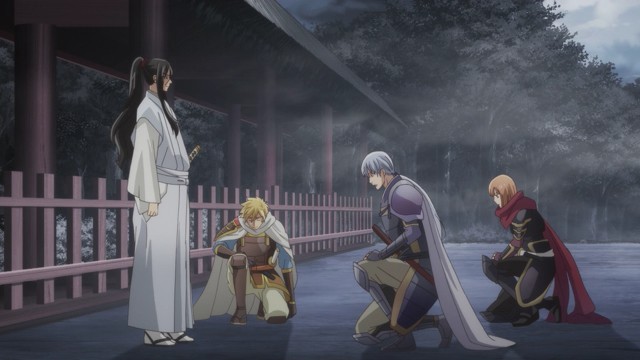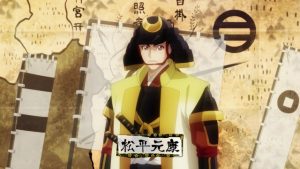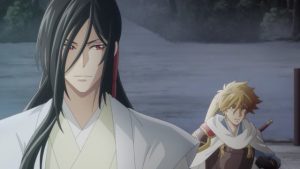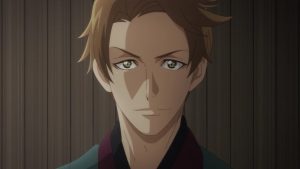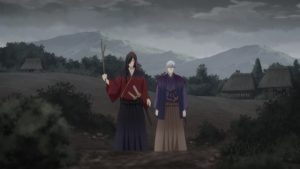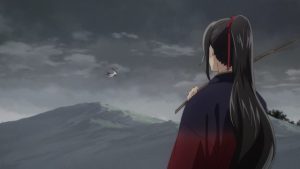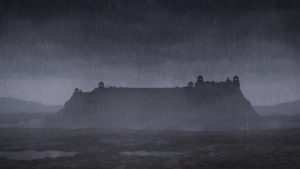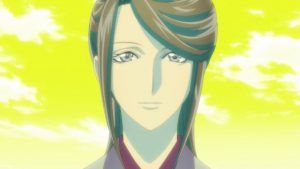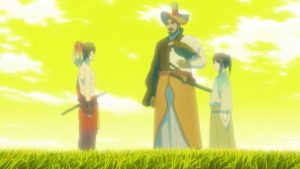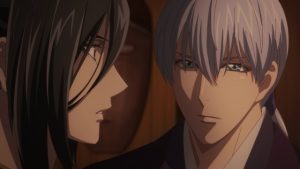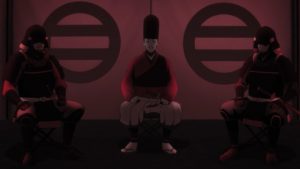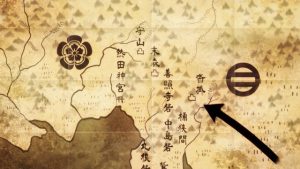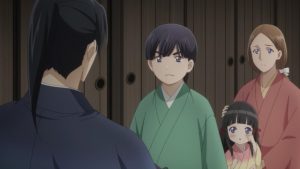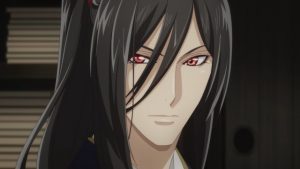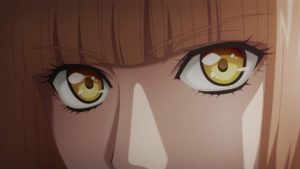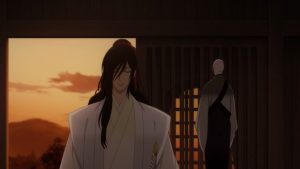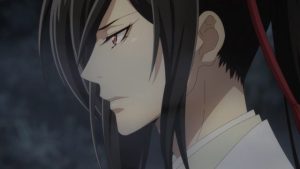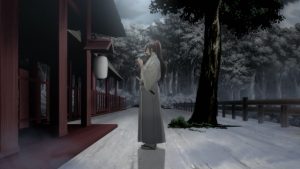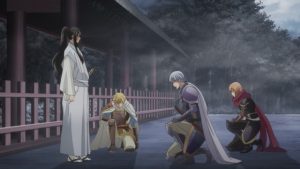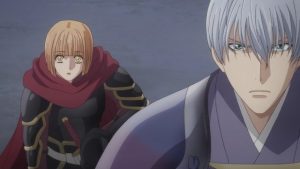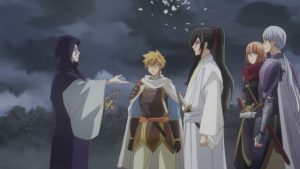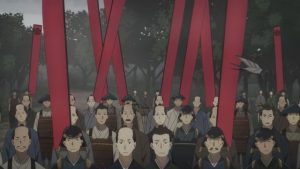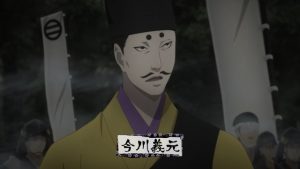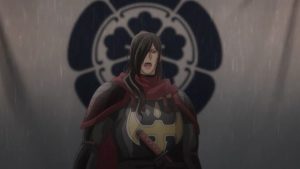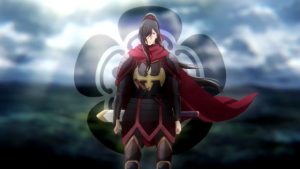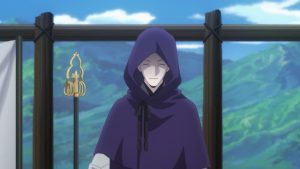 While the youth of Oda Nobunaga is a (rare) element of his story that’s relatively unexplored in anime, there is a certain risk in making a series like Kochouki. That is, you’re ending it just as things get really good. I mean, this is arguably the most important and probably the most colorful warlord of the Sengoku Period – even if we pretty much know how things played out for him in real life, after getting to know this version for three months you kind of want to see him when he really starts to kick butt and take names.
While the youth of Oda Nobunaga is a (rare) element of his story that’s relatively unexplored in anime, there is a certain risk in making a series like Kochouki. That is, you’re ending it just as things get really good. I mean, this is arguably the most important and probably the most colorful warlord of the Sengoku Period – even if we pretty much know how things played out for him in real life, after getting to know this version for three months you kind of want to see him when he really starts to kick butt and take names.
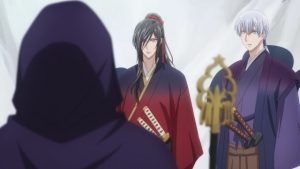 The battle with Imagawa Yoshimoto (Suzuki Katsumi) was certainly the defining moment of Nobunaga’s early career, so it does make sense to end there. Imagawa was a hugely powerful daimyou, one of the strongest in all of Japan, and his intent was to march to Kyoto and claim the role of shogun. Stopping to crush the Oda clan (who he saw as a minor annoyance) along the way was almost as afterthought – and certainly, with his massive force (Imagawa had already allied himself with the powerful Takeda and Houjou) overconfidence was the biggest danger he faced on his westward march.
The battle with Imagawa Yoshimoto (Suzuki Katsumi) was certainly the defining moment of Nobunaga’s early career, so it does make sense to end there. Imagawa was a hugely powerful daimyou, one of the strongest in all of Japan, and his intent was to march to Kyoto and claim the role of shogun. Stopping to crush the Oda clan (who he saw as a minor annoyance) along the way was almost as afterthought – and certainly, with his massive force (Imagawa had already allied himself with the powerful Takeda and Houjou) overconfidence was the biggest danger he faced on his westward march.
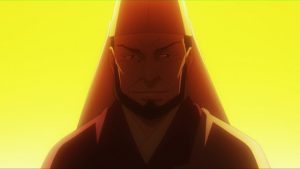 Even when the enemy entering Mikawa was reported to be 10,000 men, Nobunaga was greatly outnumbered. Imagawa scooped up one Tokugawa Ieyasu (if I have to explain his importance, well…) – then known as Matsudaira Motoyasu – and his army and continued the march to Owari. One man he was missing was Sessai Chourou, a yamabushi who was thought to be one of Imagawa’s most important military advisors. He’d died in 1557, and whether he’d have prevented what eventually befell Imagawa – or dissuaded him from this campaign altogether – we’ll never know for certain.
Even when the enemy entering Mikawa was reported to be 10,000 men, Nobunaga was greatly outnumbered. Imagawa scooped up one Tokugawa Ieyasu (if I have to explain his importance, well…) – then known as Matsudaira Motoyasu – and his army and continued the march to Owari. One man he was missing was Sessai Chourou, a yamabushi who was thought to be one of Imagawa’s most important military advisors. He’d died in 1557, and whether he’d have prevented what eventually befell Imagawa – or dissuaded him from this campaign altogether – we’ll never know for certain.
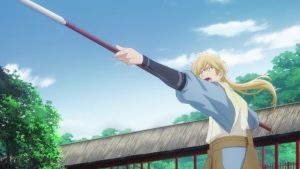 This is classic Kochouki in that the broad strokes align with what’s in the history books, the unknown spaces are painted in extremely colorful fashion, and some of the details have been changed to protect Nobunaga’s allure. Imagawa did proudly announce that he had 40,000 men – here Kichou confirms it, but the books say Nobunaga supposed the real number to be closer to 25,000. Even at 25,000 he would have been outnumbered better than 12 to 1, so a stroke of genius was certainly needed. Did the real Nobunaga intend to sue for peace, only to be foiled by meddling priest Takugen? That seems very unlikely, but it’s a good story.
This is classic Kochouki in that the broad strokes align with what’s in the history books, the unknown spaces are painted in extremely colorful fashion, and some of the details have been changed to protect Nobunaga’s allure. Imagawa did proudly announce that he had 40,000 men – here Kichou confirms it, but the books say Nobunaga supposed the real number to be closer to 25,000. Even at 25,000 he would have been outnumbered better than 12 to 1, so a stroke of genius was certainly needed. Did the real Nobunaga intend to sue for peace, only to be foiled by meddling priest Takugen? That seems very unlikely, but it’s a good story.
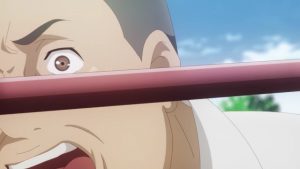 What everybody seems to agree on is that Imagawa was streamrolling his way towards Nobunaga’s stronghold, his army growing ever more cocky and careless. And that on a rainy night it was ambushed by Nobunaga’s far smaller force at Okehazama, and that Imagawa was killed in the struggle. Officially it was Nobunaga’s retainers Moori Shinsuke and Hattori Koheita who killed him, not Nobunaga himself, but given that those two aren’t even named characters in Kochouki, shifting the credit to the protagonist is not a surprising alteration.
What everybody seems to agree on is that Imagawa was streamrolling his way towards Nobunaga’s stronghold, his army growing ever more cocky and careless. And that on a rainy night it was ambushed by Nobunaga’s far smaller force at Okehazama, and that Imagawa was killed in the struggle. Officially it was Nobunaga’s retainers Moori Shinsuke and Hattori Koheita who killed him, not Nobunaga himself, but given that those two aren’t even named characters in Kochouki, shifting the credit to the protagonist is not a surprising alteration.
 Not surprisingly I find myself hoping we get a sequel to Kochouki (the manga based on it already has a spinoff), because I’d like to see what this clearly very capable anime team would do with the really meaty part of Nobunaga’s life. Of course the further we get in his story the more viewers (especially in Japan) will feel the know what really happened, because so much more is historically documented, and that’s a danger. Perhaps that’s one reason most series which tackle that part of the story do some with some absurd hook, and why so few Nobunaga series are as grounded as this one.
Not surprisingly I find myself hoping we get a sequel to Kochouki (the manga based on it already has a spinoff), because I’d like to see what this clearly very capable anime team would do with the really meaty part of Nobunaga’s life. Of course the further we get in his story the more viewers (especially in Japan) will feel the know what really happened, because so much more is historically documented, and that’s a danger. Perhaps that’s one reason most series which tackle that part of the story do some with some absurd hook, and why so few Nobunaga series are as grounded as this one.
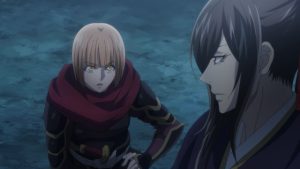 Well, it’s Deen, so nothing is impossible, but even if this is the only season of Kochoucki I’m still quite pleased with the experience. While I wouldn’t call the show educational about this largely unexplored phase of Nobunaga’s life, I would say it was enlightening. Nobunaga is possibly the most overused character in VN/manga/anime for a reason – he’s an incredibly compelling figured both for his influence and the iconoclastic way he went about attaining (and exerting) it. In a culture historically thin on true iconoclasts, someone like Nobunaga stands out that much more. And unlike most of the ludicrous fluff and pulp which treads on his name, Kochouki: Wakaki Nobunaga actually contributed something meaningful to the Nobunaga lexicon. And it was pretty damn entertaining to boot.
Well, it’s Deen, so nothing is impossible, but even if this is the only season of Kochoucki I’m still quite pleased with the experience. While I wouldn’t call the show educational about this largely unexplored phase of Nobunaga’s life, I would say it was enlightening. Nobunaga is possibly the most overused character in VN/manga/anime for a reason – he’s an incredibly compelling figured both for his influence and the iconoclastic way he went about attaining (and exerting) it. In a culture historically thin on true iconoclasts, someone like Nobunaga stands out that much more. And unlike most of the ludicrous fluff and pulp which treads on his name, Kochouki: Wakaki Nobunaga actually contributed something meaningful to the Nobunaga lexicon. And it was pretty damn entertaining to boot.


